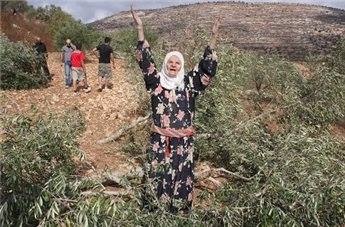Last Saturday, in Surif, south of Hebron, another action of collective olive harvesting was organized. Many volunteers, including local farmers, international activists and a bus of volunteers from Acre, picked olives in burning sunshine. The farmers cultivating the land of Surif, near Hebron, can look back at a continuous and successful struggle for the rights to their land.
Until the seventies the area had been open land only used by farmers for fodder for their animals. Then, one day in 1976 a couple of thousands of settlers gathered to occupy this land. Surif and the surrounding villages immediately gathered in resistance to the occupiers. They resisted the colonization of their land by popular protests and by bringing their case through the Israeli court system. They used any means available to defend their lands and create obstacles for the Israelis to take their land.
Among the forms of resistance is the fact that since then the farmers have been cultivating the land. The cultivation of land previously used for grazing is a tool to prevent Israel from applying a pseudo-legal tactic for confiscating land. The occupation authorities manipulate a law of the Ottoman era to declare land that for various years is not being cultivated as ‘state land’ or ‘public land’. This in turn facilitates the smokescreen of legality Israel intents to maintain in its illegal claims, confiscation and colonization of Palestinian land.
Nevertheless, five years ago the settlers came again in the night and marked the territory they wanted to colonize. The next morning people from the village removed all the signs and were triggered to increase their presence in the land. With the help from Palestinian organizations water wells and roads were built. This infrastructure encouraged the farmers to continue to cultivate their land. “We are less anxious than before, we feel that we have achieved our goal to keep our land” says one of the local farmers and lawyers. “However, we are always afraid that they will come again. We agree with the Palestinian poet Mahmoud Darwish when he writes ‘There's on this land what is worth living’.”
We need not look far for a not so uplifting story. On the other side of the valley we can see parts of the land that Israel has has declared as confiscated. In the other direction we see the apartheid Wall cutting through the lands. Many farmers have got reduced access to the land they own on the other side of the Wall. For this village in particular this concerns about 500 dunams isolated on the other side. Farmers have only limited access to their olive trees. They are allowed to go to their lands only one week during the olive harvest between from 7 am. to 5 pm. Since it is only the owners of the trees that are given the permission to cross, their harvest is limited to what they are able to do within the time they are given. Through the year they cant look after their trees, and many of them are therefore lost.
This dynamic of ongoing colonization and local resistance is repeated almost all across the West Bank. While Israel clearly has the military upper hand against the Palestinian people’s resilience, this steadfastness and determination to struggle for every inch of land day after day brings new curbs into the Zionist endeavor to cleanse Palestine from its indigenous people to replace it with a settler population.

